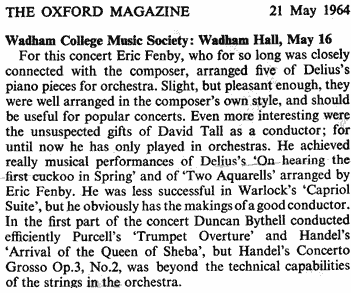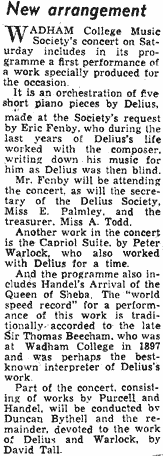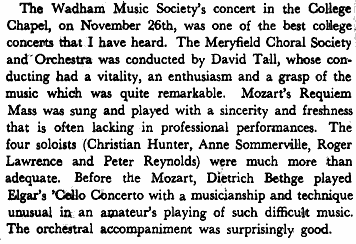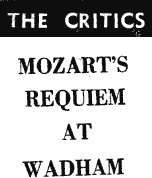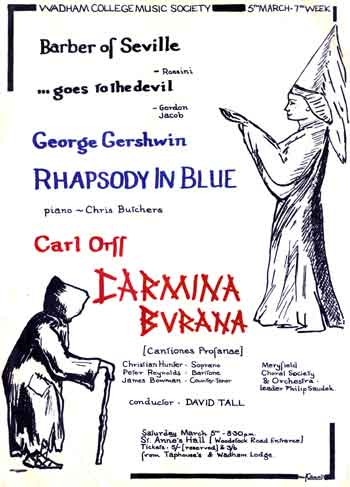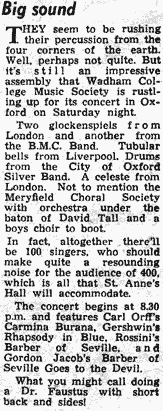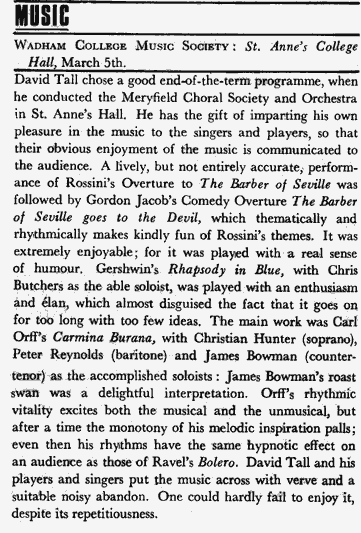|
OXFORD AS A MARRIED GRADUATE AND CONDUCTOR (1963-1966) Sue and I were married in September 1963. We had considered a honeymoon in the Channel Islands (having never had a holiday ‘abroad’). However, when I won the Junior Mathematics Prize for my success in Finals, we upgraded to ten days in Ibiza. At the last moment the trip we had planned to Ibiza was postponed for a couple of days. We decided to tell no-one. After our wedding on Saturday 21st September 1963, we left on the train from Wellingborough to London and got off at Bedford to take the train across country to Oxford. Our first meal together as a married couple was in a Chinese Restaurant in Bedford. We still remember the sweet and sour sauce based on Tomato Ketchup! In Oxford we were able to clean out our luggage of various extras, including confetti in our umbrella and a brick in our suitcase to increase the weight as we travelled by air. On the Monday before we flew off on our honeymoon we had our first difference of opinion. I claimed to know how to make roast beef and Yorkshire pudding with a 'toffee bottom' created by cooking the pudding in the fat from the beef. Sue was not pleased. She banned me from the kitchen and I stayed banned (to my own advantage) for the next 30 or 40 years of married life! After an idyllic honeymoon, we returned to Oxford, where we settled into a flat at 61 St Bernard’s Rd, and Sue became secretary to the Almoner at the Radcliffe Hospital. I enjoyed my time as a graduate student working with Michael Atiyah. He was a hugely powerful thinker with a wide grasp of research mathematics. This meant, however, that I needed to know a large range of mathematics to even begin to formulate a problem, let alone solve it. I spent two years reading books in French by Serre, Grothendieck and others without a sniff of the borderline of mathematics research which would give me the opportunity of proving a new theorem that would give me my Doctorate. Eventually Michael pointed me towards a problem relating group theory, algebra and topology and I made progress under his guidance. I did not finish my PhD until the year after I had left Oxford. At the same time, my musical activities took a significant turn. As an undergraduate I had played the viola and sang in the odd madrigal group, using my links with other orchestral players to bring together the Wadham College Orchestra, conducted by Duncan Bythell. The height of my activity as the President of the Wadham Music Society was to act as 'orchestral fixer'. In my third undergraduate year I had met Lazlo Heltay in a coffee shop as he sat reading Wagner ‘On Conducting’—the self-same Lazlo who had inspired me by his conducting in my first year. I struck up a conversation with him and told him of the pleasure I had experienced in his conducting two years before and how good I thought he was compared with all the undergraduate conductors in the various college societies. I said they were all so poor, that I could do better myself. He made a simple response, “Then why don’t you?” Why don’t I? The possibility had never, until then, occurred to me. Later that year I attended a meeting of the Delius Society in London and met Eric Fenby, who had helped Delius write down his music between 1928 and 1934. I asked him to arrange five piano pieces by Delius for my college orchestra and, to my amazement and delight, he agreed. Armed with this coup, I suggested to my College Music Society that I would like to conduct a concert. This was met with derision—David, the clumsy viola player? Conducting? But I had the carrot—the Delius world-premiere. It was finally agreed that I could share a concert in the summer of 1964. I worked very hard, writing out the Delius orchestral parts in my best (left) hand-writing (not very good at that!) and practising how to conduct. Of course, I decided to conduct left-handed. Only then did I realise the subtleties of conducting. For instance, the up-beat should move up from the outside to lead to the down-beat. This simple convention caused a profound distinction between beating three in a bar and four in a bar. To conduct three in a bar meant the beats were ‘down, out, up’ but in a four beat bar, they were ‘down, in, out, up.’ So, conducting three in a bar meant the second beat moved out to the left, but conducting four in a bar required the second beat to move to the right It took me several months practice to get the second beat to go in the right direction automatically. I also followed Beecham’s method of marking all the orchestral parts in coloured pencils to show the fingering and bowing for the string players, emphasizing louds and softs, indicating slight changes in tempo, so that everything the player needs is marked in the part. In short, I worked very, very hard to get things right, and pretended that it was effortless.
During Eric Fenby’s visit I spent time with him, walking vigorously through Christchurch Meadows. I mentioned my possibile interest in a musical career. He counselled against this, telling me that I had the pleasure of music as a hobby and the security of a future position at a university. He told me of his own struggle in his musical life and I resolved to build my future round an academic career with music ever-present through amateur choirs and orchestras. My experience in conducting grew in my remaining two years at Oxford. I became conductor of the Wadham-Lady Margaret Hall Choir for a performance of Britten’s Ceremony of Carols with harp in the autumn of 1964. I then formed the Meryfeild Choral Society (Meryfeild is the village where our college founder, Dorothy Wadham, had been raised. We tried to spell it ‘Meryfeild’, as in an ancient text, but everyone read it as ‘Meryfield’ and we eventually fell in with the natural interpretation.) The choir grew concert by concert. There were sixteen singers in the Wadham LMH choir at Christmas, 1964. Four left, but twenty joined, so that 32 performed the Kodaly Missa Brevis and Britten’s St Nicholas in the inaugural concert in the spring of 1965. The choir also performed a Missa Brevis I wrote for choir and harp. In the summer term, 40 singers took part in the Beethoven Mass in C. It was a good performance, but, for the first time, I realised I did not have the same magic that Lazlo Heltay had generated. It taught me that whatever I am, I must be myself. At the same time I was conducting orchestral concerts, including one with the Schumann Piano Concerto, Fauré Pelleas et Melisande and the Haydn London Symphony and another including Mozart’s Concerto for Violin and Orchestra K216 and his 29th Symphony. I was enjoying conducting by now, despite Eric Fenby’s suggestion that I should control, not enjoy. A small incident reminded me to stay on track. There is a notorious exposed horn entry in the Mozart Concerto which seemed to provoke the horns to freeze in rehearsal. To relax them I used to do crazy things like pulling a face each time we practiced until (I thought) nothing could possibly go wrong. At the concert, I conducted it straight. The horns fell about laughing and failed to come in. In the autumn of 1965 the sixty-strong Meryfield Choral Society, and the Wadham College Orchestra performed the Mozart Requiem together with the Elgar Cello Concerto with Dietrich Bethge as soloist. It was a moving experience. Robin Drummond-Hay wrote as follows in the Oxford Gazette:
Horace Fitzpatrick (in the Oxford Mail) wrote:
The choir expanded the following term to over a hundred singers for a concert in St Annes Hall:
By now I had to think of a future career. Michael Atiyah told me of opportunities as a lecturer at Warwick, Manchester, or King’s College, London. I told him I wanted to sit under a Linden tree. He had no idea what I was talking about. I explained that I had learnt so much working with him, but one thing I hadn’t found was my own path to the future. Wagner, in composing his great Ring Cycle, had taken a year out to ‘sit under a Linden tree’ to rediscover himself. I hadn’t even begun anything like a Ring Cycle, but I needed time for reflection. I chose to go to Sussex University by the sea at Brighton to reflect on my future life. Sue and I were very business-like over our finances. As a student I did not need to pay a National Insurance Stamp. Sue, as a married woman, need only pay a nominal amount. So she did not pay a full-stamp until we had been married for just over two years. The plan was to start our family when I started my first job in Sussex. By paying a full-stamp for a year before birth we calculated Sue would pay £42 in stamps and get a £96 maternity grant. So the payments began in the autumn of 1965. However, things didn’t go to plan. After three months, no conception occurred. Because Sue worked at the Radcliffe, she attended the infertility clinic! They told her that they could not help because she was already 38 days pregnant! Rebecca was born on September 24th at the Radcliffe Hospital, the week before we moved to Sussex for me to start my first job in October. The story continues here ... |
top of page
PERSONAL HOME PAGE | Family | Life | Photos | Music | Whisky | Links | ACADEMIC HOME PAGE
